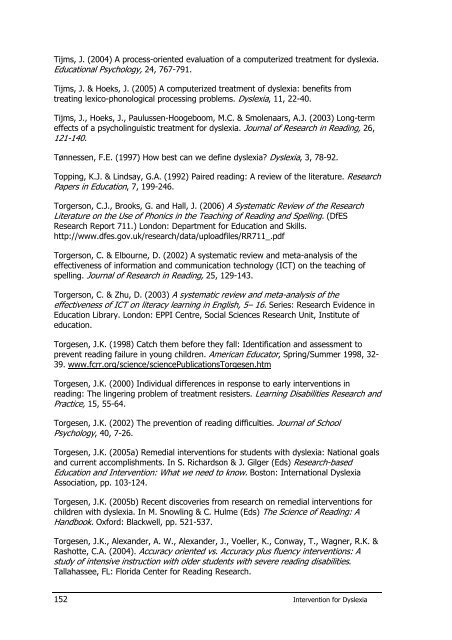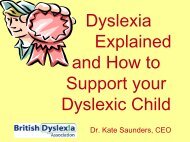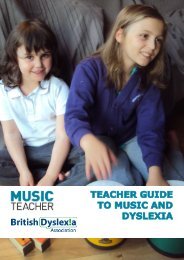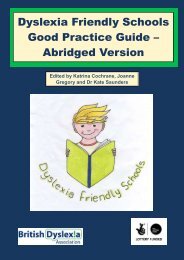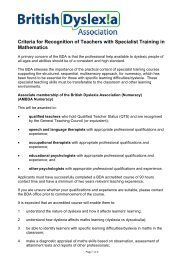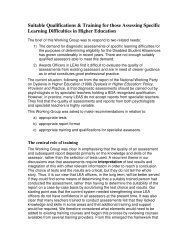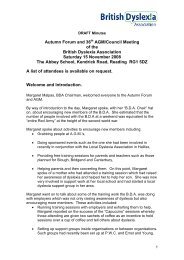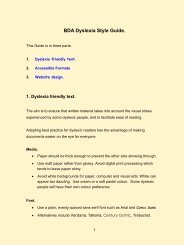Intervention for Dyslexia - The British Dyslexia Association
Intervention for Dyslexia - The British Dyslexia Association
Intervention for Dyslexia - The British Dyslexia Association
Create successful ePaper yourself
Turn your PDF publications into a flip-book with our unique Google optimized e-Paper software.
Tijms, J. (2004) A process-oriented evaluation of a computerized treatment <strong>for</strong> dyslexia.<br />
Educational Psychology, 24, 767-791.<br />
Tijms, J. & Hoeks, J. (2005) A computerized treatment of dyslexia: benefits from<br />
treating lexico-phonological processing problems. <strong>Dyslexia</strong>, 11, 22-40.<br />
Tijms, J., Hoeks, J., Paulussen-Hoogeboom, M.C. & Smolenaars, A.J. (2003) Long-term<br />
effects of a psycholinguistic treatment <strong>for</strong> dyslexia. Journal of Research in Reading, 26,<br />
121-140.<br />
Tønnessen, F.E. (1997) How best can we define dyslexia? <strong>Dyslexia</strong>, 3, 78-92.<br />
Topping, K.J. & Lindsay, G.A. (1992) Paired reading: A review of the literature. Research<br />
Papers in Education, 7, 199-246.<br />
Torgerson, C.J., Brooks, G. and Hall, J. (2006) A Systematic Review of the Research<br />
Literature on the Use of Phonics in the Teaching of Reading and Spelling. (DfES<br />
Research Report 711.) London: Department <strong>for</strong> Education and Skills.<br />
http://www.dfes.gov.uk/research/data/uploadfiles/RR711_.pdf<br />
Torgerson, C. & Elbourne, D. (2002) A systematic review and meta-analysis of the<br />
effectiveness of in<strong>for</strong>mation and communication technology (ICT) on the teaching of<br />
spelling. Journal of Research in Reading, 25, 129-143.<br />
Torgerson, C. & Zhu, D. (2003) A systematic review and meta-analysis of the<br />
effectiveness of ICT on literacy learning in English, 5– 16. Series: Research Evidence in<br />
Education Library. London: EPPI Centre, Social Sciences Research Unit, Institute of<br />
education.<br />
Torgesen, J.K. (1998) Catch them be<strong>for</strong>e they fall: Identification and assessment to<br />
prevent reading failure in young children. American Educator, Spring/Summer 1998, 32-<br />
39. www.fcrr.org/science/sciencePublicationsTorgesen.htm<br />
Torgesen, J.K. (2000) Individual differences in response to early interventions in<br />
reading: <strong>The</strong> lingering problem of treatment resisters. Learning Disabilities Research and<br />
Practice, 15, 55-64.<br />
Torgesen, J.K. (2002) <strong>The</strong> prevention of reading difficulties. Journal of School<br />
Psychology, 40, 7-26.<br />
Torgesen, J.K. (2005a) Remedial interventions <strong>for</strong> students with dyslexia: National goals<br />
and current accomplishments. In S. Richardson & J. Gilger (Eds) Research-based<br />
Education and <strong>Intervention</strong>: What we need to know. Boston: International <strong>Dyslexia</strong><br />
<strong>Association</strong>, pp. 103-124.<br />
Torgesen, J.K. (2005b) Recent discoveries from research on remedial interventions <strong>for</strong><br />
children with dyslexia. In M. Snowling & C. Hulme (Eds) <strong>The</strong> Science of Reading: A<br />
Handbook. Ox<strong>for</strong>d: Blackwell, pp. 521-537.<br />
Torgesen, J.K., Alexander, A. W., Alexander, J., Voeller, K., Conway, T., Wagner, R.K. &<br />
Rashotte, C.A. (2004). Accuracy oriented vs. Accuracy plus fluency interventions: A<br />
study of intensive instruction with older students with severe reading disabilities.<br />
Tallahassee, FL: Florida Center <strong>for</strong> Reading Research.<br />
152 <strong>Intervention</strong> <strong>for</strong> <strong>Dyslexia</strong>


